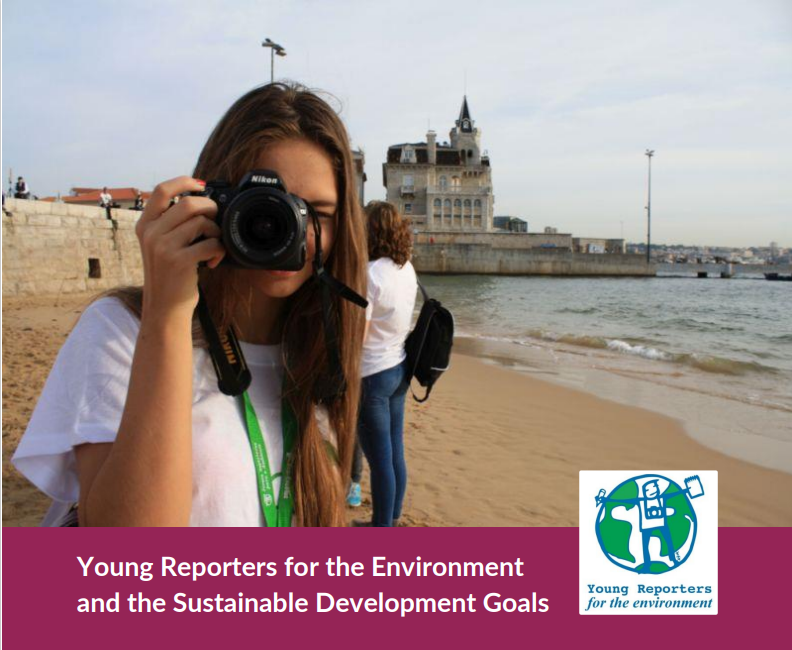YRE METHODOLOGY
THE 4-STEP FRAMEWORK
YRE engages participants aged 11-25 in environment-focused citizen journalism, encouraging them to investigate local environmental issues and solutions, and report on them through articles, photos, podcasts or videos.
The programme develops participants’ skills and knowledge about the environment, enhances communication and citizenship skills, individual initiative, teamwork, critical analysis, social responsibility, and leadership abilities.
YRE uses a tried and tested four-step methodology:
Step 1 - Investigate
Start by conducting a thorough investigation of the environmental issue that concerns you. Use reliable and credible sources such as scientific papers, government reports, and interviews with local experts to understand the scale of the issue in your local community. Find the important people or groups who are linked to this issue, with different perspectives. Analysing their role, potential biases and critically evaluate information.
This step provides opportunities to practice your:
Critical Thinking and Information Literacy: Evaluating information from various sources strengthens critical thinking skills. You will learn to distinguish credible sources, find biases, and analyse information objectively.
Research Skills and Initiative: This stage requires independent research, teaching you to find relevant information, use research tools effectively, and manage your research process and time.
Communication Skills: Learning to find important people or groups and understanding their perspectives involves active listening and clear communication.
Problem-Solving: Understanding the historical, economic, social, and political implications will help you to find the causes of your environmental issue.
Visionary Thinking: Linking your local environmental issue to the bigger global picture will help to broaden your perspectives and understanding of synoptic links.
Initiative and Self-Directed Learning: This stage will require you to proactively gather independent information on your environmental issue will help you to manage your learning and time more effectively.
Step 2 - RESEARCH AND PROPOSE SOLUTIONS
Building upon your investigation in Step 1 research potential solutions to the environmental issue. Contact environmental organisations, community leaders, and academics to try to find the most effective solutions to your environmental issue. Evaluate each solution critically, considering all potential implications.
This step provides opportunities to practice your:
Collaboration and Communication: speaking and actively listening with others to help find a solution will require you to have effective communication and good collaboration skills.
Critical Thinking and Problem-Solving: Evaluating proposed solutions involves analysing their strengths and weaknesses.
Decision-Making: Finding the most effective solution requires informed decision-making. You will learn to evaluate your research, consider different perspectives, and choose the right solution.
Strategic Thinking: Developing balanced justifications for your chosen solution requires strategic thinking. You will learn to spot potential challenges, develop counter-suggestions, and present a convincing justification for your solution.
Innovation and Creativity: While researching solutions, you should consider less obvious approaches or adaptation of existing solutions to help develop your creative thinking skills.
Confidence and Advocacy: Being able to thoroughly explain and justify your chosen solution builds confidence in your research and ability so that you can persuasively promote your solution in the next stage of the YRE programme.
step 3 - Reporting
Put your investigation and research findings into an exciting report. Find who your target audience in the local community will be, choose the best audience to help make your solution become a reality. Choose a report format that will be most interesting for them. Present your findings objectively, asking for the most promising solution with a clear reasoning and evidence.
This step provides opportunities to practice your:
Communication and Audience Awareness: Finding your target audience and making sure your report content and format is suitable for them develops communication skills and audience awareness. You will learn to adapt your report so that it is appealing to different audiences.
Storytelling and Content Creation: Creating an interesting report – whether it is an article, photograph, video, or podcast– requires strong storytelling and content creation skills.
Project Management and Planning: Planning how you will report the issue and solution involves project management skills. You will learn to develop a clear plan, manage your time effectively, and meet deadlines.
Advocacy and Persuasion: Using experts and evidence to support your chosen solution strengthens your advocacy skills.
Leadership and Influence: By creating a powerful report, you will influence your audience and motivate them to act.
Confidence and Public Speaking (if applicable): If you choose to present your report publicly, you will develop confidence and public speaking skills.
Collaboration: Creating a report with others, as part of the YRE International Collaboration will teach you how to work effectively in a team, delegate tasks, and support each other's strengths.
step 4 - dissemination
The last step is to share your report and make your proposed solution a reality! Find opportunities to present your report to important people or groups who can help with this. Creating a communication plan will also help you to choose which media platforms to use to raise awareness and generate community support for your proposed solution. Actively take part in discussions and engage with others who share your interest for environmental responsibility. Remember, your single voice with well-researched information and a clear solution can create a ripple effect of positive change in your community.
This step provides opportunities to practice your:
Public Engagement and Communication: Presenting your report and engaging with the community on social media or participating in discussions requires strong public engagement and communication skills. You will learn to connect with diverse audiences, present your ideas clearly, and advocate for your solution effectively.
Community Building and Collaboration: Spreading awareness and generating support involves building relationships with community members that share your environmental concerns.
Networking and Influence: Discussions with those who can help conduct your chosen solution may involve negotiation and persuasion. It will be important to present compelling arguments (backed with evidence), address concerns, and find a solution that works for all.
Resilience and Persistence: Building momentum for change requires resilience and persistence. You will have to overcome obstacles, criticism and may have to adapt your solution. Remember to stay motivated- leadership and inspiration take time.
Guides and resources
YRE and the Sustainable Development Goals
The YRE programme supports the 17 Sustainable Development Goals (SDGs)
in a multifaceted way.
Find out how through this comprehensive guide
Greening education and the YRE programme
Education for Sustainable Development (ESD) is key to tackling the urgent transformation we all need in our lives and societies.
In the context of the Greening Education Partnership, the YRE programme provides this guide as a learning approach to Greening Communities.



